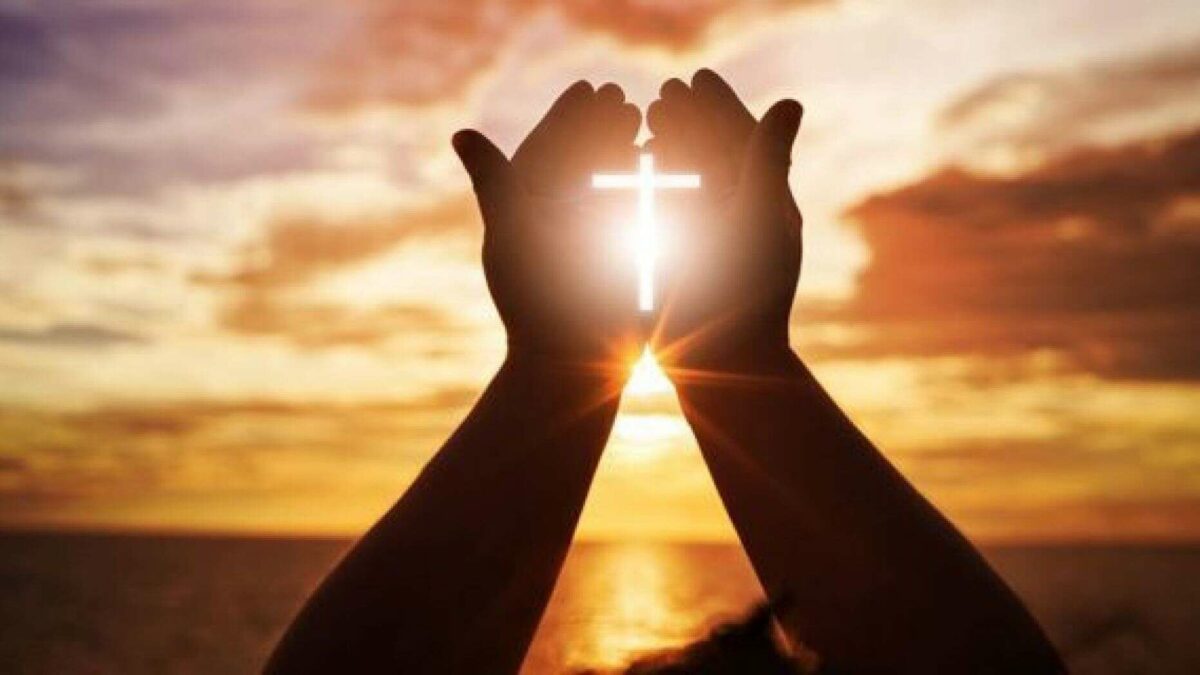“After the battle Judas led his men to the town of Adullam. It was the day before the Sabbath, so they purified themselves according to Jewish custom and then observed the holy day. By the following day it was urgent that they gather up the bodies of the men who had been killed in battle and bury them in their family tombs. But on each of the dead, hidden under their clothes, they found small images of the gods worshiped in Jamnia, which the Law forbids Jews to wear. Everyone then knew why these men had been killed. So they praised the ways of the Lord, the just judge, who reveals what is hidden, and they begged him that this sin might be completely blotted out. Then, Judas, that great man, urged the people to keep away from sin, because they had seen for themselves what had happened to those men who had sinned. He also took up a collection from all his men, totaling about four pounds of silver, and sent it to Jerusalem to provide for a sin offering. Judas did this noble thing because he believed in the resurrection of the dead. If he had not believed that the dead would be raised, it would have been foolish and useless to pray for them. In his firm and devout conviction that all of God’s faithful people would receive a wonderful reward, Judas made provision for a sin offering to set free from their sin those who had died”. (2nd Maccabees 12:39-45)
According to the Catholic Encyclopedia, the clearest Bible reference about prayers for the dead is from the Second Book of Maccabees. When soldiers were preparing the bodies of their slain comrades for burial they discovered they were wearing amulets taken from a pagan temple which violated the law of Deuteronomy so they prayed that God would forgive the sin these men had committed. The New Testament echoes this notion in the second letter of Timothy when Paul prayed for someone who died named Onesiphorus, saying: “May the Lord grant him to find mercy from the Lord on that day” (2 Timothy 1:18).
In 1 Cor 15:29-30, Paul mentions people being baptized on behalf of the dead, to atone for their sins. They must be in purgatory: a temporary place of purification after death before attaining the beatific vision or the glory of beholding the face of God. Phil 2:10 tells us that every knees bends to Jesus, in heaven, on earth, and “under the earth” which is the realm of the righteous dead. Heb 12:14 says that without holiness no one will see the Lord. We need final sanctification to attain true holiness before God. Heb 12:23 also says that the spirits of just men who died in godliness are “made” perfect. They do not necessarily arrive perfect. In 1 Peter 3:19; 4:6, Jesus preached to the spirits in the “prison.” These are the righteous souls being purified for the beatific vision. In Rev 21:4, no mourning or pain, but only after the coming of the new heaven and the passing away of the current heaven and earth. While Rev. 21:27, nothing unclean shall enter heaven. Even the propensity to sin is uncleanliness. No purgatory means no salvation for most people. Gen 50:10; Num 20:29; Deut 34:8 show examples of ritual prayer and penitent mourning for the dead for specific periods of time. In Baruch 3:4, Baruch asks the Lord to hear the prayers for the dead of Israel.
The Catechism of the Catholic Church also has something to say about prayers for the dead, stating: “All who die in God’s grace and friendship, but still imperfectly purified, are indeed assured of their eternal salvation; but after death they undergo purification, so as to achieve the holiness necessary to enter the joy of heaven” (Catechism of the Catholic Church 1030). The Roman catacombs where early Christians were buried also were places of prayer. The funeral liturgy, is “an act of worship, and not merely an expression of grief.” It is equally a time when the Church gathers with the family and friends of the deceased “to give praise and thanks to God for Christ’s victory over sin and death, to commend the deceased to God’s tender mercy and compassion, and to seek strength in the proclamation of the Paschal Mystery,” it adds. The prayers in the funeral liturgy express hope that God will free the person who has died from any burden of sin and prepare a place for him or her in heaven. According to the Catechism, most Catholics who don’t merit hell still need purification before entering heaven and pass through a state when they die that the Church describes as purgatory. In a question-and-answer page on www.BustedHalo.com, a Paulist-run website, Paulist Father Joe Scott said praying for the dead has further origins in our belief in the communion of saints. Living members of this communion can “assist each other in faith by prayers and other forms of spiritual support. Christians who have died continue to be members of the communion of saints. We believe that we can assist them by our prayers, and they can assist us by theirs.
Growing up as child, I didn’t know how I got into believing that everything I believed in, every other person equally believed in it. Until I began to meet other Christians who do not celebrate Christmas, Easter, New Year and many others who do not celebrate the life of the Saints. Two experiences of other people’s faith that has lived with me for years now are: (1) At the funeral of a friend of mine who was not a Catholic and he drinks alcohol: The pastor who preached on that day came down from the pulpit; facing and pointing hand at the coffin, he said to the people; you see this man; he will go to hell. He was an alcoholic; and not a Christian. His grieving wife, became louder in her cries and pains. The entire church was loud in silence, trying to hear more from the pastor who was so convinced, that the alcoholic man was bound for hell. Many people were filled with surprise and shock at such a total lack of empathy from such a preacher. Certainly Jesus’ approach to sinners like Mathew and Zacchaeus the tax collectors and Mary Magdalene in spite of their obvious sinful life style was that of compassion, mercy and encouragement. Jesus never condemned any sinner.
My second experience happened two years ago, again at the funeral of a community member who equally was not a Catholic. But was good to so many people; Muslims and Christians. Before he was laid to rest, the homilist at the funeral said: “ I don’t know why we are wasting time here, there is no repentance in the grave, we are mad like the Catholics who waste their time praying for a sinner who did not repent while he or she was alive”. The entire congregation turned and looked at me as if I was the one who made the comment. The preacher took close to 30 minutes explaining the uselessness of our gathering together to pray for a dead man. Traditionally, the Catholic Church devotes the 2nd of November to commemorate and pray for the souls of all the faithful departed. And in turn most people use the whole of the month of November to pray for the repose of the souls of the faithful departed. For us Catholics praying for our loved ones who have died is a sacred duty. St Paul says weather we are dead or alive we belong to Christ (Romans 14: 8). If we belong to Christ at all times what stops us from praying for the dead who also are Christ’s. The Oratory of Santa Maria dell’Orazione e Morte (Holy Mary of Prayer and Death) in Rome has thousands of Skulls in its crypt: One of the skulls has this engraving: hodie mihi, cras tibi. Today me tomorrow you. Let’s keep our departed friends, brothers and sisters in our prayers because one day we too may be in need of it.
Fr Stephen Ojapah is a priest of the Missionary Society of St Paul. He is equally the director for Interreligious Dialogue and Ecumenism for the Catholic Diocese of Sokoto, a member of IDFP. He is also a KAICIID Fellow. ([email protected])

 Join Daily Trust WhatsApp Community For Quick Access To News and Happenings Around You.
Join Daily Trust WhatsApp Community For Quick Access To News and Happenings Around You.


